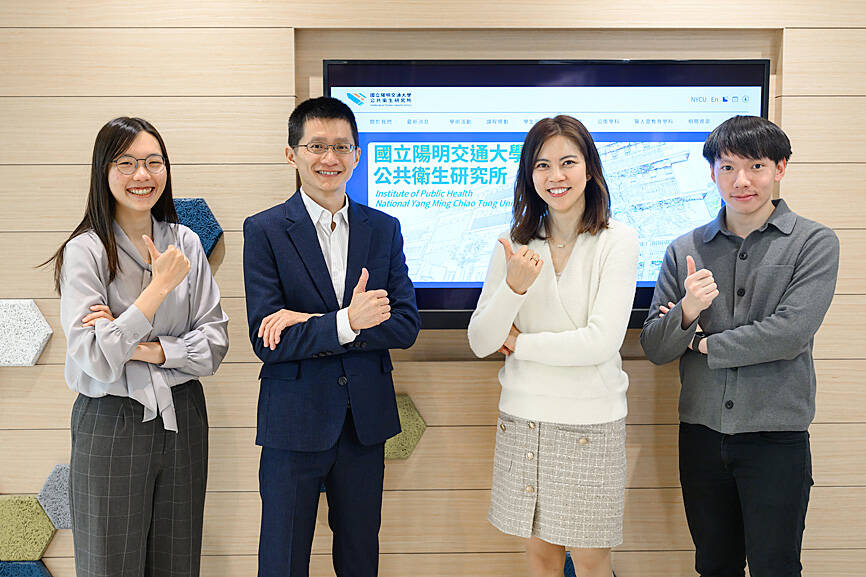Taiwanese scientists have found a link between air pollution and dementia risk in elderly people, a Yang Ming Chiao Tung University research team told a news conference in Taipei yesterday.
Study coauthor Chuang Yi-fang (莊宜芳), associate professor of public health, said that the medical community has long understood that air pollution can be a significant risk factor in cognitive health.
However, the mechanism by which pollution affects the mind had remained largely unknown until the research team clarified the connection between air quality and improvements to focus and brain structure in elderly people, he said.

Photo courtesy of National Yang Ming Chiao Tung University
The study tracked the magnetic resonance imaging and cognitive test records of 412 people over the age of 60 residing in urban and rural areas with varying air quality to measure the effects of pollution, he said.
Spatial modeling was used to gauge the concentration of pollutants, including particulate matter, nitrogen dioxide and ozone in the subjects’ environment, he said.
The research established a strong correlation between good air and better structural integrity of white brain matter and improved scores in cognitive tests measuring mental focus, he said.
Genetics, healthy habits and environmental factors govern brain aging, but only the first of the trio is an immutable trait, he said, adding that reducing air pollution would likely result in better brain health in older people.
The study significantly contributes to the field by shedding light on air pollution’s effects on brain health in Asians instead of cardiovascular health in Caucasians, said Pan Wen-chi (潘文驥), coauthor and professor of environmental and occupational health at the university.
The study was published in August last year in the journal Environment International.

US President Donald Trump said "it’s up to" Chinese President Xi Jinping (習近平) what China does on Taiwan, but that he would be "very unhappy" with a change in the "status quo," the New York Times said in an interview published yesterday. Xi "considers it to be a part of China, and that’s up to him what he’s going to be doing," Trump told the newspaper on Wednesday. "But I’ve expressed to him that I would be very unhappy if he did that, and I don’t think he’ll do that," he added. "I hope he doesn’t do that." Trump made the comments in

NOT AN OPENING: Trump’s violation of international law does not affect China’s consideration in attacking Taiwan; Beijing lacks capability, not precedent, an official said Taiwanese officials see the US’ capture of the president of Venezuela as a powerful deterrent to Beijing’s aggression and a timely reminder of the US’ ability to defeat militaries equipped with Chinese-made weapons. The strikes that toppled Venezuelan President Nicolas Maduro signaled to authoritarian leaders, including Chinese President Xi Jinping (習近平), US President Donald Trump’s willingness to use military might for international affairs core to US interests, one senior official in Taipei’s security circle said. That reassured Taiwan, the person said. Taipei has also dismissed the idea that Trump’s apparent violation of international law could embolden Beijing, said the official, who was not

A cold surge advisory was today issued for 18 cities and counties across Taiwan, with temperatures of below 10°C forecast during the day and into tonight, the Central Weather Administration (CWA) said. New Taipei City, Taipei, Taoyuan and Hsinchu, Miaoli and Yilan counties are expected to experience sustained temperatures of 10°C or lower, the CWA said. Temperatures are likely to temporarily drop below 10°C in most other areas, except Taitung, Pingtung, Penghu and Lienchiang (Matsu) counties, CWA data showed. The cold weather is being caused by a strong continental cold air mass, combined with radiative cooling, a process in which heat escapes from

Snow this morning fell on Alishan for the first time in seven years, as a strong continental cold air mass sent temperatures plunging across Taiwan, the Central Weather Administration (CWA) said. The Alishan weather station, located at an elevation of about 2,200m in central Taiwan, recorded snowfall from 8:55am to 9:15am, when the temperature dropped to about 1°C, the CWA said. With increased moisture and low temperatures in the high-altitude Alishan area, the conditions were favorable for snow, CWA forecaster Tsai Yi-chi (蔡伊其) said. The last time snow fell at the Alishan weather station was on Jan. 10, 2018, while graupel fell there